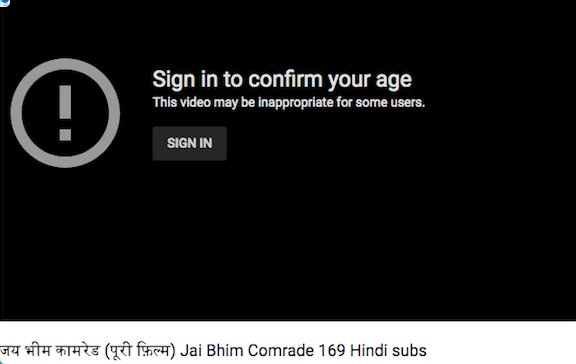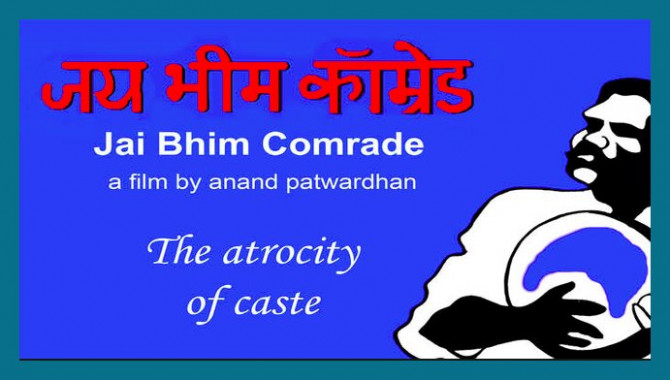A Brahminical Youtube?
Award-winning documentary film-maker Anand Patwardhan was in for a rude shock when he got a message from YouTube a couple of days ago to say that his acclaimed film ‘Jai Bhim Comrade’ was now age-restricted!
YouTube’s decision to flag the film for age restrictions on the basis of a report or complaint by a viewer is a strange attempt to impose a strange kind of half-censorship on the film, which has already garnered thousands of views. The film has got a certificate for public exhibition for all ages, so YouTube’s decision is completely inexplicable.

Patwardhan took to Facebook to protest the decision, terming it as ‘YouTube Brahminism’. He said:
My film "Jai Bhim Comrade" has just been "age restricted" by what can only be described as a Brahminical Youtube! Ironically it has a "U" certificate (without a single cut) from the CBFC as well as a National Award from the Govt of India. Both these were granted before the current BJP came to power and started spreading ultra Brahminical ideas of intolerance and control. It is heartening to note that Youtube is keeping itself upto date with the current political climate. None of our internet spaces may be free of Brahminical control in future.
It was hard enough fighting (and winning) court battles against the censorship of CBFC. Now it looks like we may have to take on the giant Youtube and international players.
Vive La Liberte !
In its note to ‘Anand Verité’(Patwardhan’s YouTube channel), YouTube says that its community guidelines do not allow videos that contain violent or graphic content that appears to be posted in shocking, sensational or disrespectful manner.
Attempts to access the film, minus one’s age-verified accounts, yield a blank screen warning that the film is age-restricted. The decision to do so only illustrates, yet again, the manner in which internet companies can take unilateral decisions over content on their platforms. Whereas they have claimed in the past that that they are responsive to the laws of the country they operate in, its clear from this instance that their own guidelines override the laws.
‘Jai Bhim Comrade’ is a searing commentary on the caste system through the suicide of a sensitive and political artist Vilas Ghogre, following the killings of dalits in Ramabai Nagar, Mumbai in 1997 and the emergence of Dalit activism in the wake of the killings of the Bhotmange family in Khairlanji in 2006.
It took 14 years to complete and was released in 2011. It was awarded the special Jury prize in the National Film Awards in 2012.
The film has had multiple screenings all over the country and was uploaded on YouTube for public viewing garnering thousands of views. There’s a trailer, a Part I in Hindi and English, with subtitles, a Q & A with the director. Besides, other YouTube channels have also uploaded the film. Fans of the film have also uploaded only the songs in the film, including the iconic song by Ghogre ‘Jaltoy Marathawada’ and some of the performances of Kabir Kala Manch that feature in the film.
Almost all of these garner thousands of views, testifying to the popularity of the film.
Patwardhan told The Hoot that he was just sent a notice by YouTube with the extract of their community guidelines. “Perhaps someone complained but I find it absolutely ridiculous. How can it be age-restricted? It has a 'U' certificate from the Central Board of Film Certification (CBFC). I want everyone to see the film. It's been up on YouTube for the last year. I've sent them a strong letter of objection. If they don't change this, I'll take them to court.”
Patwardhan expressed concern that the decision was an attempt to impose YouTube’s sovereignty over the law of the land and would bode ill for any attempt by independent film-makers to use platforms owned by big Internet corporations like YouTube (a Google company) to exhibit their work.
Geeta Seshu is consulting editor of The Hoot
